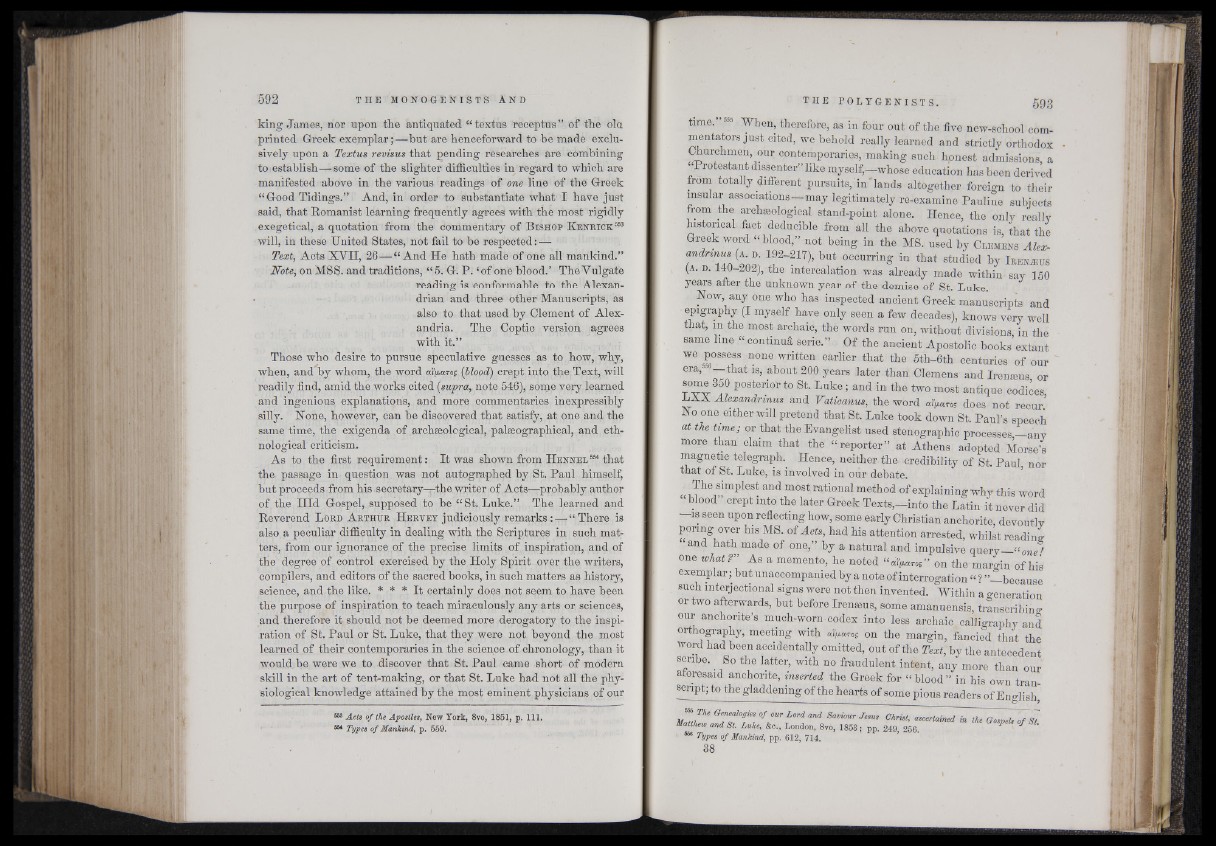
king James, nor upon the antiquated “ textus receptus” of the ola
printed Greek exemplar;—but are henceforward to be made exclusively
upon a Textus revisus that pending researches are combining
to ¡establish—some of the slighter difficulties in regard to which are
manifested above in the various readings of owe line of the Greek
“ Good Tidings.” And, in order to substantiate what I have just
said, that Romanist learning frequently agrees with the most rigidly
exegetical, a quotation from the commentary of B ish o p K e n r ic k 553
will, in these United States, not fail to be respected: —
Text, Acts XVII, 26—“ And He hath made of one all mankind.”
Note, on MSS. and traditions, “ 5.G. P. ‘of one blood.’ The Vulgate
reading is conformable to the Alexandrian
and three other Manuscripts, as
also to that used by Clement of Alexandria.
The Coptic version agrees
with it.”
Those who desire to pursue speculative guesses as to how, why,
when, and by whom, the word ai'fiams (blood) crept into the; Text, will
readily find, amid the works cited (supra, note 546), some very learned
and ingenious explanations, and more commentaries inexpressibly
silly. Hone, however, can be discovered that satisfy, at one and the
same time, the exigenda of archaeological, palseographical, and ethnological
criticism.
As to the first requirement: It was shown from H e n n e l 554 that
the passage in question was not autographed by St. Paul himself,
but proceeds from his secretary—the writer of Acts—probably author
of the Hid Gospel, supposed to be “ St,Luke.”, The learned and
Reverend L ord A r th u r H e r v e y judiciously remarksfejjj“]There is
also a peculiar difficulty in dealing with the Scriptures in such matters,
from our ignorance of the precise limits of inspiration, and of
the degree of control exercised by the Holy Spirit over the writers,
compilers, and editors of the sacred books, in such matters as history,
science, and the like.. * * * It certainly does not seem to have been
the purpose of inspiration to teach miraculously any arts or sciences,
and therefore it should not be deemed more derogatory to the inspiration
of St. Paul or St. Luke, that they were not beyond the most
learned of their contemporaries in the science of chronology, than it
would be were we to discover that St. Paul came short of modern
skill in the art of tent-making, or that St. Luke had not all the physiological
knowledge attained by the most eminent physicians of our
553 Acts of the Apostles, New York, 8vo, 1851, p. 111.
654 Types of Mankind, p. 559.
time. 555 When, therefore, as in four out of the five new-school commentators
just cited, we behold really learned and strictly orthodox
Churchmen, our contemporaries, making such hpnest admissions, a
Protestant dissenter!’like myself,—whose education has been derived
from totally different pursuits, in'lands altogether foreign to their
insular -associations may legitimately re-examine Pauline subjects
from the archaeological stand-point alone. Hence, the only really
historical fact Reducible from all the above quotations is, that the
Greek word: “ blood,” not being in the MS. used by Clemens Alex-
andrinus{k. d 192-217), but occurring in that studied by I r em s u s
(a . D. 140-202), the intercalation was already made within- say 150
years after the unknown year of the demise of St. Luke,
How, any one who has inspected ancient Greek manuscripts and
epigraphy (I myself have only seen a few decades), knows veiy well
that, in the most archaic, the words run on, without divisions in the
same l.ne “ eontinuii serie.” Of the ancient Apostolic books extant
we possess none wntten earlier that the 5th-6th centuries of our
era, that is, about 200 years later than Clemens and Irenseus or
some 350 posterior to St. Luke; and in the two most antique codices,
7. Alexandrinus and Vaticanus, the word aip-aros does not recur
No one either will pretend that St. Luke took down St. Paul’s speech
at the time; or that the Evangelist used stenographic processes,-any
more than claim that the reporter” at Athens adopted Morse’s
magnetic telegraphy Hence, neither the credibility of St. Paul nor
that of St. Luke, is involved in our debate.
The simplest and most rational method of explaining why this word
blood crept into the later Greek Texts,—into the Latin it never did
- i s seen upon reflecting how, some early Christian anchorite, devoutlv
pormg over his MS. of Acts, had his attention arrested, whilst reading
and hath made of one,” by a natural and impulsive query—1'‘one'
one what?" As a memento, he noted “ « ¡ jW on the margin of his
exemplar; but unaccompanied by a note of interrogation “ ? ” because
such interjectional signs were not then invented. Within a generation
or two afterwards, but before Irenasus, some amanuensis, transcribing
our anchorite’s much-worn codex into less archaic calligraphy and
orthography, meeting with on the margin, fancied that the
word had been accidentally omitted, out of the Text, by the antecedent
scribe. ’ So the latter, with no fraudulent intent, any more than our
aforesaid anchorite, inserted the Greek for “ blood” in his own tran
script; to the gladdening of the hearts of some pious readers of English,
I f l P Lord and Saviour Jesus Christ, ascertained in the Gospels of Si
Matthew and St. Luke, &c., London, 8vo, 1853; pp. 249, 256.
566 Types of Mankind, pp. 612, 714.
38